
- Tax Planning


My First job interview experience | A life-long memorable one!
For freshers, facing the first interview is nothing less than having bittersweet feelings at its best. Not only are we too excited but also very nervous for those one-on-one interview rounds. The mixed feelings can be overwhelming and it either leaves you speechless or you end up blabbering things you regret later.
Even if you have given many interviews, your first job interview experience would remain as a memorable one forever. For some of you, it would have given a positive experience and for some, a negative experience.
But, for me, it was a turning point experience! It has changed the way I look at interviews.
(Please excuse me for posting a non-finance related article in my Personal finance related blog!)
More than 16 years ago… in 2007, my first job interview was for India’s first organized and modern Retail company– Foodworld .

About Foodworld : The supermarket chain was started nearly two decades ago (1996) as a division of Spencer & Co., part of the RPG Group, but became a separate company in 1999. Kishore Biyani-promoted Future Retail has later bought Foodworld Supermarkets in 2018.
Let me now narrate the entire interview process..!
It was 2003, I was in the final semester of MBA from ICFAI Business School, Chennai. My institute’s placement cell had come to know that Foodworld was looking out for Store Manager-Trainees to manage their upcoming supermarket chains in Andhra, Karnataka, Tamilnadu and Kerla.
For an MBA graduate, getting into an entry level managerial post as the first employment is a decent achievement to kick-start one’s career. I was all excited along with my other Marketing-major batch-mates.
If I remember correctly, around 6 of us (batch mates) went for the interview, which was organized at the Spencer’s corporate office – Spencer Plaza, Anna Salai, Chennai.

The same day, job aspirants from other renowned institutes had also come to attend the interview at Spencers.
We were all briefed on the selection process, which had three rounds – i) written exam, ii) face to face interview with Middle level manager + HR manager & ii) face to face interview with the CEO of Food world.
I was not at all tensed about the interview process but was super excited to give it my best shot.
My First job interview experience
The first round was more about aptitude, marketing, statistics and general management topics. The second round was with middle-level marketing manager and HR manager. They were very impressed with my academic record.
- I was a state-first rank holder in my Intermediate Board Exams.
- Was the University topper in Graduation &
- Was the batch topper in PG.
I had cleared the first two rounds of the selection process without much hassle and was all set for the final showdown with the CEO of the company.
That day, I was very clear in my mind – not to be desperate and be as confident as possible. My much-awaited interview slot (I was the second one to be interviewed) had come and I finally entered the CEO’s spacious room.
- CEO – Hi Sreekanth, good afternoon, be seated.
- Sreekanth – Very good afternoon sir,
- CEO – Hope, you had lunch?
- Sreekanth – Not yet sir
- CEO – Call me Raghu (Raghu Pillai was the then CEO of Food world)
- Sreekanth – Ok sir
- CEO Raghu Pillai – smiled and asked, are you comfortable with me sitting like this and watching cricket (TV was in mute though) ? Do you like cricket?
- Sreekanth – I am comfortable and yes, I like playing and watching cricket!
- CEO Raghu Pillai – Ok Sreekanth, you may leave now!
The total time took by him to interview me was around 2 to 3 minutes. I remember that he took around 15 minutes of time to interview the first job aspirant.
By the time I came out of the Spencer Plaza building, I understood the possible mistake that I had committed on that day! (The very next day, the HR team had informed me that I could not make it to the final list of selected candidates..)
So, what really happened in those 2 minutes? How could he come to a conclusion that I am not the right candidate for the job in just 2 minutes? Why did he ask, was I comfortable or not during the interview?
Let me now narrate it for you..
As soon as I entered the CEO’s room, I saw he was very casually seated on his chair with his legs on top of a desk (the legs were not facing me though, like as in the below picture) . He was watching cricket on tv (it was on mute!).

Though I was really comfortable with his behavior, I should have objected the way he was sitting in an interview. I realized that I am interviewing them just as much as they’re interviewing me. The interview etiquette should be followed by both the parties and its not applicable just for the job aspirant.
This experience has left a long-lasting impression on me! From that day, wherever and whenever I go for an interview, I make sure to ask relevant questions at the end of the interview, say ‘NO’ if I don’t like anything, say ‘don’t know’ if I am not aware of anything, as much as possible to be open and straight-forward and be honest!
Believe me that I have a whopping 90% success rate in clearing the interviews. This strength of mine turned out to be a bane as I ended up being a job hopper (not for money!) .
My gyaan about interviews :
- Always remember that it’s a win-win situation and don’t be desperate.
- Your Aptitude is important in initial rounds of the job selection and in the final rounds its your ATTITUDE which matters the most!
- Your academic achievements may take you till the company door-steps but that alone will not win you the job.
- Do not job hop for Salary hike.
- If you are employed in a wrong industry, switch to the right one as early in your career as possible.
- Don’t ever be over-confident during the interview process.
- Keep acquiring new skill sets relevant to your job.
- Work hard for the interviews but be smart during the interviews!
- A failure in an interview is not the end of the road. “ A bend in the road is not the end of the road unless you fail to make the turn .”
More about Raghu pillai :
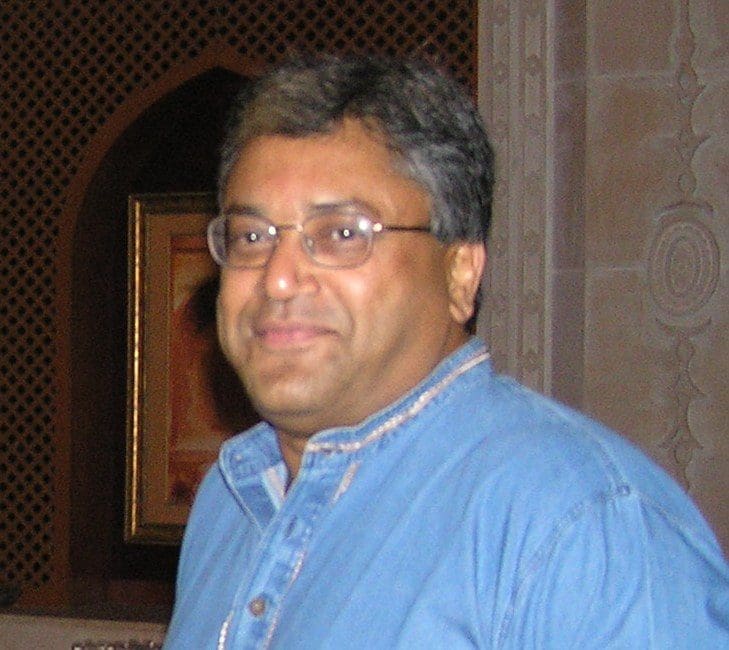
- Raghu Pillai was one of the founders and best known faces of Indian corporate retail.
- He was part of the start-up team of FoodWorld Supermarkets, which heralded organised retail into the country in the mid-nineties.
- He was also part of the team which kick-started Reliance’s retail operations in the country.
- Before joining Reliance, Pillai served as the president and chief executive officer of RPG Enterprises – Retail, where he was responsible for building from inception four Companies that includes Food World Super Markets Ltd, Music World, Health & Glow and Spencer Giant Hyper Markets for seven years.
- Raghu ji was known for his boldness in anything he did, whether in work or life.
- He passed away in 2011 when he was 54 years of age.
- ” Raghu Pillai was one of the founding members of modern retail much before Mr B.S. Nagesh of Shopper’s Stop or myself came on the scene. He was a people’s leader and would be missed for his leadership style which was infectious.” – Kishore Biyani, Chairman – Future Group.
Continue reading :
- Resignation : Employee Benefits & Personal Finances – Checklist
- A Negative Credit Score Can Hurt Your Job Search!
- 13 Strategies / Tips for dealing with Layoffs (or) Job Losses
- 5 Practical ways to increase your Take Home Salary (Pay)!
- 13 FAQs on Gratuity Benefit Amount & Tax Implications
- Leave Encashment & Tax Implications
(Image courtesy of Loveluck at FreeDigitalPhotos.net) (Post first published on : 22-July-2019)
About The Author
Sreekanth Reddy
Hi Man, Its been long time, i took today time to go through Relakhs. Well said Attitude changes everything. The way you narrated your experience it lovely……
Is this my Progeon Mathi??? Thank you for visiting my blog 🙂
Awesome message Sreekanth. Its all about attitude which creates our destiny in life and becoming successful.
Thank you dear Suresh…!

ReLakhs.com is a blog on personal finances. The main aim of this blog is to help you make INFORMED financial decisions by presenting the content on money matters in a simple, unbiased and easy to understand manner.
Popular Posts
Latest court judgements on women’s property rights, who gets the joint bank account monies if one account holder dies, income tax deductions list fy 2023-24 | under old & new tax regimes, top 5 best aggressive hybrid equity mutual funds | equity-oriented balanced funds, useful links.
- Community (Forum) - SignUp
- Forum (Old)
- Privacy Policy
Viewsletter
Cared by T-Square Cloud
Session expired
Please log in again. The login page will open in a new tab. After logging in you can close it and return to this page.
- Share on WhatsApp
- Share on Facebook
- Share on Twitter
- Share on LinkedIn
- Share on Email
Essay Papers Writing Online
10 essential tips for crafting an effective interview essay.

Unlock the magic of storytelling by capturing the essence of human experiences through the power of interviews. Going beyond just words on a page, an interview essay transforms a simple conversation into a captivating narrative that engages readers on a deep and emotional level. By delving into the intricacies of someone’s thoughts, experiences, and insights, an interview essay brings a unique perspective to the table, allowing readers to immerse themselves in a world of diverse voices and compelling narratives.
With the interview essay, you have the opportunity to weave a rich tapestry of perspectives, uncovering hidden gems of wisdom that often go unnoticed in everyday life. As you engage in thoughtful conversations with individuals from different walks of life, you unravel unique stories that have the power to educate, inspire, and enlighten readers. Through the artful use of quotes, anecdotes, and vivid descriptions, an interview essay breathes life into the pages, creating an intimate connection between the reader and the interview subject.
Mastering the art of the interview essay requires not only strong interviewing skills but also empathy, curiosity, and the ability to connect with people on a deeper level. By listening intently and asking thought-provoking questions, you can encourage interviewees to open up, share their experiences, and provide insights that transcend the surface level. With each interview, you embark on a journey of discovery, peeling back the layers of someone’s life and inviting readers to join you on this transformative expedition.
Choosing the Right Interviewee
When embarking on the journey of conducting an interview, the first and crucial step is selecting the right interviewee. This step requires careful consideration and evaluation to ensure a successful and meaningful interview. The interviewee plays a pivotal role in shaping the tone and direction of the interview, bringing unique perspectives, experiences, and insights to the conversation.
One important aspect to consider when choosing an interviewee is their expertise and knowledge in the subject matter. Look for individuals who possess deep understanding and experience in the area of interest. This will contribute to the richness and authenticity of the interview, allowing for in-depth discussions and a deeper exploration of the topic.
Another factor to consider is the interviewee’s articulation and communication skills. A great interviewee should be able to express their thoughts and ideas clearly and effectively. Look for individuals who have the ability to convey their thoughts in a coherent and concise manner, as it will enhance the overall quality of the interview.
Furthermore, it is valuable to select an interviewee who is open-minded and willing to share their perspectives openly. This fosters an environment of trust and encourages candid discussions during the interview. Seek interviewees who are comfortable expressing their opinions and are receptive to exploring different viewpoints.
Additionally, it is essential to consider the interviewee’s availability and willingness to participate in the interview. Ensure that the individual is committed and available for the agreed-upon interview date and time. This will ensure a smooth and hassle-free process, allowing for ample preparations and scheduling.
Overall, selecting the right interviewee is a vital step in the interview process. By considering factors such as expertise, communication skills, openness, and availability, you can ensure that your interview is engaging, informative, and insightful.
Preparing a List of Questions
When it comes to conducting an interview, one of the most important steps is preparing a thoughtful and engaging list of questions. A well-crafted set of questions can not only help you gather the necessary information for your interview essay, but it can also create a dynamic and engaging conversation with your interviewee.
To begin, it’s important to consider the purpose of your interview and what you hope to learn from your interviewee. Whether you are writing a profile on a notable individual or exploring a specific topic, your questions should be targeted and focused. Think about the key information you want to gather and structure your questions accordingly.
When crafting your questions, it’s also important to strike a balance between open-ended and specific inquiries. Open-ended questions allow your interviewee to share their thoughts and experiences in more depth, while specific questions can help guide the conversation and ensure you obtain the information you need.
Additionally, it’s helpful to consider the interviewee’s background and expertise when formulating your questions. Tailoring your questions to their unique perspective and experiences can help elicit more thoughtful and insightful responses. Doing some preliminary research on your interviewee can provide valuable context and inform the types of questions you ask.
Lastly, don’t be afraid to be flexible and adapt your questions in the moment. Interviewing is a dynamic process, and sometimes the best insights and stories come from unexpected avenues of conversation. Allow the interview to unfold naturally and be prepared to adjust your questions based on the flow of the dialogue.
Remember, the goal of preparation is not to rigidly stick to a script, but rather to have a well-thought-out framework that can guide the conversation and help you achieve your objectives as an interviewer.
Conducting the Interview
When it comes to the process of gathering information for your interview essay, the stage of conducting the interview is crucial. This is the moment when you will have the opportunity to engage with your interviewee and extract valuable insights to create a compelling narrative. The effectiveness of your interview will greatly depend on your preparation, approach, and ability to establish trust and rapport with the person you are interviewing.
Preparation: Before conducting the interview, it is essential to thoroughly research and familiarize yourself with the topic and the person you will be interviewing. This will not only help you ask informed and relevant questions but also show your interviewee that you are genuinely interested and invested in the conversation. Take the time to identify key areas you want to explore, as well as any specific questions you may have.
Approach: When you actually sit down with your interviewee, it is important to approach the interview with a professional yet friendly demeanor. Introduce yourself and explain the purpose of the interview, highlighting the value it will bring. Make sure to actively listen, allowing the conversation to flow naturally. Use open-ended questions to encourage your interviewee to share their thoughts and experiences in depth. Additionally, keep in mind that body language and non-verbal cues play a significant role in building rapport, so strive to maintain eye contact and exhibit attentive body language.
Establishing Trust and Rapport: To create a comfortable and trusting environment, it is crucial to show genuine interest, empathy, and respect for your interviewee’s perspectives and experiences. Actively listening and responding empathetically will help build rapport and allow your interviewee to open up and share their insights more freely. It is also essential to be mindful of any sensitive topics or boundaries that your interviewee may have and to approach them with sensitivity and tact.
By carefully preparing for the interview, approaching it with professionalism and empathy, and focusing on building trust and rapport, you will set the stage for a successful and insightful conversation that will serve as a foundation for your interview essay.
Transcribing and Organizing the Material
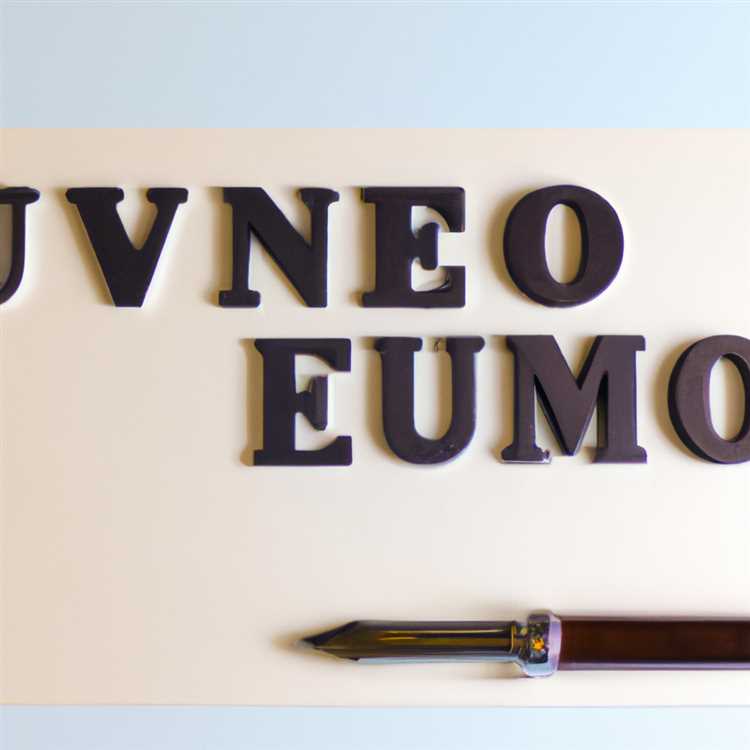
One of the essential steps in creating a well-rounded interview essay is the transcription and organization of the material gathered during the interview process. After conducting the interview, the next crucial task is to transcribe the recorded audio or written notes into a readable format.
Transcribing the interview material involves carefully listening to the audio recording or reviewing the written notes and converting them into a written document. This process requires keen attention to detail and accuracy to ensure that the interviewee’s words are accurately represented in the final essay.
Once the material is transcribed, it is essential to organize it in a logical and coherent manner. This involves identifying the main ideas and key points discussed during the interview and arranging them in a structured outline. By organizing the material, it becomes easier to identify the flow of thoughts, highlight important quotes, and create a cohesive narrative for the essay.
In addition to structuring the material, it is also crucial to categorize the information based on relevant themes or topics. This helps in creating a comprehensive and well-structured essay that covers all aspects of the interview. By organizing the material into distinct sections, it becomes easier to focus on specific areas and present the information in a clear and concise manner.
Overall, transcribing and organizing the material is a crucial step in the process of writing an interview essay. It ensures that the information gathered during the interview is accurately represented and presented in a well-structured manner. By giving careful attention to detail and organizing the material effectively, the essay can effectively convey the interviewee’s thoughts and experiences to the reader.
Crafting the Essay
Creating a well-crafted essay is the essential next step after conducting a successful interview. This part of the process involves carefully structuring your thoughts and findings, and presenting them in a clear and engaging manner.
One effective way to approach the crafting of your essay is to make use of a table. This table can act as a visual tool to help you organize and outline the key points and themes that emerged from your interview. By visually mapping out these elements, you can ensure that your essay has a logical flow and a coherent structure.
In addition to using a table, it is important to consider the tone and style of your essay. While it should be professional and objective, it is also important to infuse it with your own unique voice and perspective. This will help to make your essay more engaging and personal, allowing the reader to connect with the subject and the insights you gained from the interview.
When crafting your essay, it is also important to consider the target audience. Who will be reading your essay and what do they hope to gain from it? Tailoring your language and content to suit the needs and expectations of your audience will help to ensure that your essay is effective in conveying the key messages and ideas you want to communicate.
Finally, don’t forget to proofread and edit your essay before submitting it. Pay attention to grammar, spelling, and punctuation errors, as well as the overall clarity and organization of your writing. Taking the time to refine and polish your essay will greatly enhance its impact and make it more enjoyable for the reader.
| Tips for Crafting the Essay |
|---|
| Use a table to visually organize your key points and themes |
| Infuse your essay with your own voice and perspective |
| Consider your target audience and tailor your language and content accordingly |
| Proofread and edit your essay to ensure clarity and correctness |
Related Post
How to master the art of writing expository essays and captivate your audience, convenient and reliable source to purchase college essays online, step-by-step guide to crafting a powerful literary analysis essay, unlock success with a comprehensive business research paper example guide, unlock your writing potential with writers college – transform your passion into profession, “unlocking the secrets of academic success – navigating the world of research papers in college”, master the art of sociological expression – elevate your writing skills in sociology.
- PRO Courses Guides New Tech Help Pro Expert Videos About wikiHow Pro Upgrade Sign In
- EDIT Edit this Article
- EXPLORE Tech Help Pro About Us Random Article Quizzes Request a New Article Community Dashboard This Or That Game Happiness Hub Popular Categories Arts and Entertainment Artwork Books Movies Computers and Electronics Computers Phone Skills Technology Hacks Health Men's Health Mental Health Women's Health Relationships Dating Love Relationship Issues Hobbies and Crafts Crafts Drawing Games Education & Communication Communication Skills Personal Development Studying Personal Care and Style Fashion Hair Care Personal Hygiene Youth Personal Care School Stuff Dating All Categories Arts and Entertainment Finance and Business Home and Garden Relationship Quizzes Cars & Other Vehicles Food and Entertaining Personal Care and Style Sports and Fitness Computers and Electronics Health Pets and Animals Travel Education & Communication Hobbies and Crafts Philosophy and Religion Work World Family Life Holidays and Traditions Relationships Youth
- Browse Articles
- Learn Something New
- Quizzes Hot
- Happiness Hub
- This Or That Game
- Train Your Brain
- Explore More
- Support wikiHow
- About wikiHow
- Log in / Sign up
- Education and Communications
- College University and Postgraduate
- Academic Writing
How to Write an Interview Essay
Last Updated: March 11, 2024 Fact Checked
This article was co-authored by Diane Stubbs . Diane Stubbs is a Secondary English Teacher with over 22 years of experience teaching all high school grade levels and AP courses. She specializes in secondary education, classroom management, and educational technology. Diane earned a Bachelor of Arts in English from the University of Delaware and a Master of Education from Wesley College. This article has been fact-checked, ensuring the accuracy of any cited facts and confirming the authority of its sources. This article has been viewed 466,378 times.
An interview essay is designed to give the reader a general impression of the interview subject and to present their thoughts on a select group of topics. It also offers the opportunity to develop deeper insights by analyzing the interviewee's responses within a larger context. Interview essays are a common school assignment, and provide useful skills for those interested in journalism, or just being good writers in general. There are several formats that fit into the category, but a good interview essay of whatever type can make the reader feel as though they were asking the questions.
Interviewing for an Essay

- If your essay is to be a factual piece, you'll want to interview someone who has expertise in the subject matter you'll be addressing. If your paper is about a science topic, you'll want to interview a scientist in that field. If your paper is about a period of history, you'll want to interview either a historian or someone who's lived through that period of history.
- If you plan to make your essay an opinion piece, you'll likely want to interview someone who has a strong opinion about the topic covered in your essay. Ideally, you want someone who can express opinions articulately, and who also has credentials in the area you plan to write about.
- If your piece will have a narrow perspective, you'll need to interview only one or two people. If your piece will present a general consensus, you'll need to interview more people, probably with varying expertise and credentials.

- When available, read works about and works written by your subject, both in print and online. At the same time, research the topic associated with your subject. The more you know about both, the more intelligent questions you can ask.
- Look for previous interviews your subject has given, as well. These will give you an idea of what questions the person has been asked before, so you can decide on appropriate subjects for your own questions, including questions that no one else has asked.
- Questions that require "yes" or "no" answers are good for gathering specific factual information; open-ended "how," "why," and "tell me about" questions are great for gathering additional background material not found in your research.
- Draw up a list of the questions you are prepared to ask. Have more questions ready than you will likely use, so that you can make adjustments as the interview takes place. (For instance, your subject may begin focusing on what you thought was a side topic, but turns out to be the key part of your interview.) Rank your questions in order of importance to make sure you ask your best ones, or list them all in the order you'd ask them and color-code the most important ones.

- Choose a quiet place with few distractions for your interview site. A library, restaurant, or campus location if you're doing this for a college writing class would be suitable.
- You may want to get the interviewee's consent to use their comments in your essay in writing, as well as permission to record those comments during the interview. By law, if you are recording an interview conducted over the phone, you must obtain written permission. [4] X Trustworthy Source University of North Carolina Writing Center UNC's on-campus and online instructional service that provides assistance to students, faculty, and others during the writing process Go to source
- It's helpful to have a backup interviewee in case the person you plan to interview can't make it.
- Be on time at the place you've agreed to meet for the interview.

- Using a recording device (with permission) is almost always advisable, as it permits you to save your note-taking for jotting down your insights on contexts, themes, how your subject approaches the questions, his/her comfort level, and so on.
- Be patient and respectful as you ask your questions and wait for responses. Give the interviewee time to reflect, and you will likely be rewarded with more insightful answers. A few deeper responses are usually better than many superficial ones.
- Immediately after the interview, write down your thoughts and impressions about the interview and interviewee. They may help you shape the essay.
- Always end the interview by thanking the person.
Writing the Essay

- Narrative format. This form allows paraphrasing of some information the interviewee says, along with direct quotes for the material you most want to emphasize. This is the most likely format for a class assignment, and offers the most opportunity to add context and analysis.
- Conversational format. This is a looser format than the formal writing style required for most essays. You can address the reader directly and use both first and second person. This format can be suitable for anything from class assignments to magazine articles.
- Question-and-answer format. This form presents your questions to the interviewee, followed by the interviewee's responses. (That is, the text looks something like this: (Your Name): How long have you been in the circus? (Interviewee's Name): About 35 years.) These are always direct quotes, although you may insert explanatory material in parentheses and substitutions, such as a person's name in place of a personal pronoun, in brackets. This format is best suited for essays with only a single interviewee or a closely related group, such as spouses or the core cast of a TV show.
- Informative format. This format usually interweaves the interview with research you've done on the subject, incorporating some of that research in the text to provide background and give it a little more color.

- Read over your interview notes and listen to any audio / video recordings you have. Utilizing both whenever available will allow you to thoroughly consider both the highlights of the interview and the most significant themes to emerge from it. These, in turn, will inform your outline of what information your essay will cover and how it will appear. [9] X Research source
- One possible outline could be an introduction that starts with an anecdote about the interviewee and then presents your thesis statement, several key points that support the main focus, and a conclusion that summarizes the information presented. Traditional school essays often utilize a five paragraph format (introduction, three supporting paragraphs, conclusion), and this can often work with interview essays as well.

- If, however, the purpose of your essay is to use your interviewee's comments to support a position or examine a larger theme, your thesis will probably be a statement of that position or theme, with the interview / interviewee placed within that context. For instance: "John Doe's mixed feelings of pride and betrayal reflect those shared by many Vietnam veterans still with us."
- Regardless of essay format, make your thesis clear and concise, and be sure that the remainder of your essay refers back to it. See How to Write a Thesis Statement for more advice.

- Interviews can sometimes produce a good deal of repetitive answers (even with high-quality questions), so you may need to trim repetitions and unnecessary elements from the body of your essay. Make sure that whatever material you do keep remains true to both the spirit of the interview and the overarching focus of your essay. [10] X Research source
- A handout from the Writing Center at the University of North Carolina (available at http://writingcenter.unc.edu/handouts/oral-history/ ) provides a wealth of valuable materials on interview essays. It includes, for instance, examples of how to utilize the same interview materials in a transcription (question-and-answer format), a presentation of individual experiences (quotations and paraphrases), and the placing of the interview / interviewee in a larger context (paraphrasing and quotations with ample explanation).

- Reading over the essay yourself is a good start, but it is always wise to have another set of eyes look it over as well. Another reader is likely to catch errors, repetitions, and unclear sections that you have glossed over. [12] X Research source
- Go back to your original interview notes, recordings, and transcripts, and make sure that your essay continues to reflect the actual interview. Layers of editing and revising can sometimes cause the essay to drift away from the original source and intent. You may even want to let the interviewee read it over to ensure that it captures their voice. [13] X Research source

- Any materials you used for research, information about the interviewee, or context for the essay itself should be referenced in the approved citation format for your essay.
- Make sure one more time that any direct quotations from your source are placed in quotation marks, and any paraphrasing is done without quotation marks. Don't put words in your subject's mouth, and respect the words that do emerge from it.
What Are The Dos And Don’ts Of a Journalistic Interview?
Expert Q&A

- After the interview, send the interviewee a written thank-you note expressing your appreciation for their time. Thanks Helpful 0 Not Helpful 0
- If the person you're interviewing is busy or elderly, you may want to plan for more than one interview session. Observe the interviewee for signs of impatience or fatigue. Conduct multiple, shorter sessions if necessary. Thanks Helpful 0 Not Helpful 0

- If you plan to interview someone over the telephone, permission to record the conversation is required by law. Thanks Helpful 15 Not Helpful 3
You Might Also Like

- ↑ http://writingcenter.unc.edu/handouts/oral-history/
- ↑ https://www.indeed.com/career-advice/interviewing/interview-paper
- ↑ http://www.whatkidscando.org/featurestories/2007/maine_students/tip_sheets/FIRST-PERSON%20ESSAYS%20TIP%20SHEET.pdf
- ↑ http://www.brighthubeducation.com/help-with-writing/97515-how-to-write-an-interview-essay/
- ↑ https://owl.purdue.edu/owl/general_writing/the_writing_process/proofreading/proofreading_suggestions.html
About This Article

To write an essay from an interview, you’ll first have to decide on the format the essay will take, as this will determine the structure and what you write. The most common form is the narrative format, in which you use direct quotes and paraphrase your subject to add context and detail, or you can write in a more conversational tone, or even in a directly transcribed question-and-answer form. Once you decide on format, plan an outline by forming a central thesis, which will be the central statement your essay is making. Add onto the outline by drafting supporting evidence directly from the interview and from other sources, like books, newspaper articles, other essays, anything else to support your point. Write and finish the essay by combining information from the interview and other sources with your own explanations and words. To learn about how to conduct the interview to get enough information to write about and how to finish the writing process, keep reading! Did this summary help you? Yes No
- Send fan mail to authors
Reader Success Stories
Oct 19, 2016
Did this article help you?

Tyler Jordan
Sep 11, 2016
Tawana Moos
Nov 20, 2017
Mar 28, 2016
David Mcaniel
May 23, 2017

Featured Articles

Trending Articles

Watch Articles

- Terms of Use
- Privacy Policy
- Do Not Sell or Share My Info
- Not Selling Info
Get all the best how-tos!
Sign up for wikiHow's weekly email newsletter
How to Write an Interview Essay: Questions, Topics, Examples & Tips
.webp)
In the realm of writing, interviews bring a unique touch, a personal narrative that adds depth to your words. Picture this: someone's story unfolding through your pen, their experiences laid out for the world to read. But how do you capture that essence, ask the questions that matter, and turn it into a compelling read?
Fear not! Our guide breaks the interview essay examples down for you, step by step, making essay writing for interview as simple as sharing a cup of coffee with a friend. So, let's get started on turning conversations into captivating tales that will help you get your first remote job !
What Is an Interview Essay?
The process of interview essay writing is essentially a conversation transformed into written form. It involves engaging with someone, posing thoughtful questions, and then translating their responses into a narrative for others to read. Think of it as capturing the essence of a personal exchange, where the interviewee shares their experiences, insights, or expertise.
The goal is to convey the individual's unique perspective and story in a way that resonates with readers. It's like being a storyteller with a purpose – to amplify someone else's voice and share their narrative with a broader audience. Interview essays provide a platform for individuals to express their thoughts, share their journeys, and contribute their perspectives to a wider conversation.
How to Write an Interview Essay?

Step 1: Define the Essay's Purpose
Start your journey into crafting a job interview essay by figuring out exactly what you want to achieve. Ask yourself: Why am I conducting this interview, and what story or message do I want to share? It could be about someone's experiences in the professional world, valuable insights into a particular industry, or shedding light on the intricacies of a specific job role. Having a clear purpose will help you stay on track and make sure your essay has a point.
Step 2: Explore the Subject through Research
Before you dive into the interview, take some time to get to know the person you'll be talking to. Look into their background, experiences, and anything else that might be important. This research not only helps you come up with good questions but also shows the person you're interviewing that you care about their story. Knowing more about your subject makes your questions more thoughtful, turning the phone interview into a richer and more interesting conversation.
Interview Essay Topics
Need a dose of inspiration? Our experts have compiled compelling essay topics for interview. Explore and choose one that sparks your curiosity and invites in-depth analysis:
- How do people feel about remote work after experiencing it?
- What's the most memorable volunteer experience for community members?
- How do small business owners handle daily challenges?
- What makes a family game night special for different families?
- How do individuals manage stress in their everyday lives?
- What are the favorite childhood memories of people in your community?
- How do pet owners bond with their furry friends?
- What are some creative ways people stay active without going to the gym?
- How do grandparents share wisdom with younger generations?
- What role do hobbies play in people's lives for relaxation?
- How do individuals practice self-care on a busy schedule?
- What's the favorite local food joint for residents in your area?
- How do students manage their time during exam periods?
- What's the secret behind successful long-term relationships?
- How do individuals find joy in simple, everyday moments?
- How do people discover and choose their favorite books to read?
- What's the go-to comfort food for individuals on a rainy day?
- How do commuters make the most of their time during daily travels?
- What's the most cherished holiday tradition for families in your community?
- How do individuals celebrate personal achievements and milestones?
Step 3: Formulate Your Questions
Now that you've got a grip on your essay's purpose and know your subject, it's time to craft thoughtful questions. Think about what will bring out the most interesting and meaningful responses. Ask open-ended questions that encourage the interviewee to share their experiences, insights, or opinions. This step is like laying the groundwork for a conversation that will unveil the essence of your subject's story.
Interview Essay Questions
- How has the integration of technology impacted your communication within your family?
- Can you share a transformative experience from participating in a unique sports or recreational activity?
- What strategies have you employed to foster a positive work-life balance in your professional journey?
- In your opinion, what elements contribute to creating a successful and harmonious blended family dynamic?
- How do you navigate and manage personal finances to ensure financial stability and security?
- Can you recall a specific instance where a mentor or role model profoundly influenced your life choices?
- What innovative methods have you discovered for staying connected with distant relatives or friends?
- How do you incorporate mindfulness and mental wellness practices into your daily routine?
- In your experience, how do cultural traditions shape and influence family dynamics and relationships?
- Can you share a travel experience that left a lasting impact, broadening your perspective on life?
- What are your strategies for maintaining a healthy and active lifestyle despite a busy schedule?
- How do you approach and overcome creative blocks or challenges in your artistic endeavors?
- Can you recount a significant moment of personal growth or self-discovery that shaped your identity?
- What lessons have you learned from navigating a cross-cultural or interfaith relationship?
- How do you approach building a sense of community and fostering connections within your neighborhood?
- How do you incorporate eco-friendly practices and sustainability into your daily life?
- How much of an impact does social media have on personal relationships and societal dynamics?
- Did you ever face a major decision and the thought process that guided your choice?
- How do you stay informed about current events, and how does this impact your worldview?
- How much are you involved in a hobby or passion that brings you joy and fulfillment?
Step 4: Reach Out to the Interviewee and Ready Yourself for the Interview
Take the plunge and connect with the person you're interviewing. Reach out in a friendly manner, explaining your purpose and why you value their perspective. Once you've secured the interview, prepare yourself. Familiarize yourself with the questions, make sure your equipment (if any) is ready, and create a comfortable setting for the conversation. Being organized and ready ensures a smooth and effective interview process, allowing the person you're speaking with to open up and share their story effortlessly.
Step 5: Conduct the Interview
Now that you've set the stage, it's time for the main event! As you step into the interview, approach it with a genuine sense of curiosity, as if you're unwrapping a present of stories and insights. Take a moment to breathe and let the conversation unfold naturally. Pose your questions with patience, allowing the interviewee the space to share their thoughts.
Active listening is key – not just to their words but to the nuances in their tone and the emotions beneath the surface. It's in these unscripted moments that the most captivating and unexpected stories often emerge. Embrace flexibility, as sometimes the richest narratives come when you least anticipate them. Remember, your ultimate aim for successful interview essays is to authentically capture the essence of the person's experiences or insights, so let the first job interview be a genuine and unfiltered exploration.
Step 6: Select an Interview Essay Format
As you wrap up the interview, consider how you want to present its essence. The right format sets the tone and it is your tool to engage the readers effectively in your interview essays.
You have a variety of styles to choose from: opt for the classic Q&A, where questions and answers flow seamlessly; weave a narrative, transforming responses into a compelling story; or adopt a thematic structure for a logical organization. Each style brings its own flavor to the table. The format you choose becomes the lens through which your readers experience the interview, so select one that not only enhances the narrative but also resonates with your audience. Ultimately, your choice of format shapes how your audience engages with the richness of the conversation.
Step 7: Develop an Interview Essay Outline
Now that you've gathered all the insightful details, it's time to structure your essay. Create an interview essay outline that organizes the key points, highlights significant moments, and establishes a logical flow. Consider the introduction, body, and conclusion, and map out how the interviewee's story will unfold. This roadmap will guide you on how to write an interview essay, ensuring a cohesive and engaging narrative that does justice to the richness of the conversation.
Introduction:
The introduction to an interview essay is where you say hello to your reader and give them a sneak peek into what's coming. Briefly introduce who you interviewed and share a little about why their story is worth hearing. You can start with something interesting to grab attention, like a question or a surprising fact. The main job here is to make your reader curious about what comes next.
The body is where the real action happens. Think of it like the main part of a story. Each paragraph tackles a different aspect of what you learned in the interview. Start with the most important points and follow a logical order. Share the juicy details and interesting moments. Keep things organized, so your reader can easily follow along. It's all about presenting the interviewee's story in a way that's interesting and makes sense.
Conclusion:
The conclusion is your chance to wrap things up. Summarize the key points from the interview and remind your reader why it's important. You can add a personal reflection or suggest what readers might take away from the interviewee's experiences. End on a strong note, leaving a lasting impression. It's like saying goodbye but making sure it's memorable.
Step 8: Proofread Your Work
Before sharing your interview essay writing with the world, take a moment to proofread. Check for grammar and spelling errors, ensure the sentences flow smoothly, and verify that your chosen format enhances the overall readability. This step is your chance to polish the final product and present a well-crafted piece. A carefully proofread essay not only reflects professionalism but also ensures that your audience can fully focus on the captivating story you've worked so diligently to convey.
Step 9: Include Proper Citations
As the finishing touch to your interview essay, don't forget to give credit where it's due. Include proper citations to acknowledge any external sources or references used during your research. Whether it's direct quotes, paraphrased information, or data from other works, citing your sources adds credibility to your essay and shows respect for the original contributors. Follow the citation style specified by your assignment or publication guidelines, ensuring transparency and integrity in your writing. This step ensures that your readers can trace back and explore the sources that contributed to the depth of your interview essay.
Life Is about Balance — Don’t Do Things in Excess.
Hire an Expert to Balance Work and Studies!

Interview Essay Example
To illustrate the art of turning a conversation into a compelling essay, let's delve into an interview essay sample with Sarah Rodriguez, an avid urban gardener with a green thumb and a passion for sustainable living. Through this example, we'll explore how to capture the essence of someone's experiences and insights, transforming a casual chat into a narrative that resonates:
Sarah Rodriguez's balcony garden in the heart of the city is a testament to the possibilities of urban gardening. As we sat surrounded by thriving plants, she shared her journey into sustainable living and the joys of cultivating a green oasis in a concrete jungle.
Urban gardening might seem like a niche interest, but for Sarah, it's a way of life that has transformed not only her living space but also her perspective on sustainable practices. In this interview, we'll dive into the roots of Sarah's passion, exploring how she turned a small balcony into a flourishing garden and gained insights into sustainable living along the way.
Sarah's journey began with a desire for fresh herbs, a longing that led her to experiment with container gardening. 'It started small, with a few potted herbs like basil and mint,' she recalled. 'But as I learned more about sustainable gardening practices, it evolved into something much more significant.'
Each paragraph in the body delves into a different aspect of Sarah's experience. From the challenges of limited space to the joy of harvesting her own produce, the narrative weaves through her urban gardening adventure. Key moments, such as discovering the benefits of composting or experimenting with rainwater harvesting, add depth to the story.
As we wrap up the interview, Sarah reflects on the impact of urban gardening on her life. 'It's not just about the plants; it's about connecting with nature in the midst of a bustling city,' she shares. Through Sarah's journey, we glimpse the potential of turning a small balcony into a sustainable haven. This interview essay not only captures the practical aspects of urban gardening but also highlights the personal growth and connection to the environment that can stem from such a simple yet impactful endeavor.
Bringing It All Together
We hope you picked up some handy tips in this guide to shine in your journalism class. But hey, if you crave more guidance on how to prepare for a job interview essay, our expert writers are all ears and ready to share more insights! Feel free to reach out for extra help and nail that assignment with confidence.
Need a Professional Experienced Writer?
We exclusively work with the greatest authors, who offer students unique, customized writing. Ask for our assistance if you need to purchase essays online


Job Interview Essay
Job interview essay generator.

As one would expect during a job interview, your employer may be asking you to write something . This would be in the form of an essay. This is usually about your experiences, your skills and all the basic information they need to know more about you. They do this to see and to understand you as a person. Here are some 7+ job interview essay examples you can check out for some tips on what to write and what to avoid.
7+ Job Interview Essay Examples
1. job interview essay template.
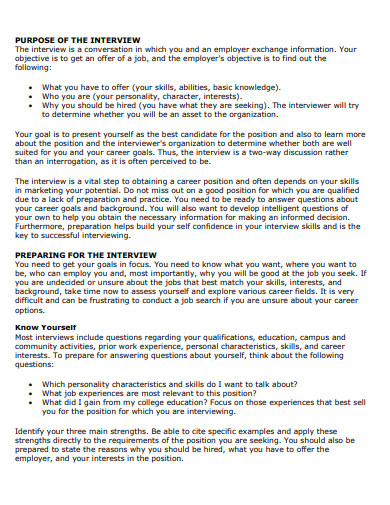
Size: 95 KB

2. Sample Job Interview Essay
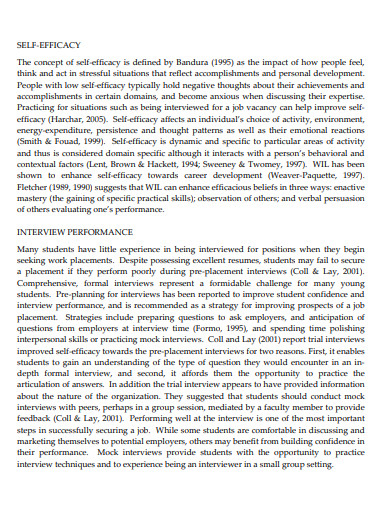
Size: 430 KB
3. Basic Job Interview Essay
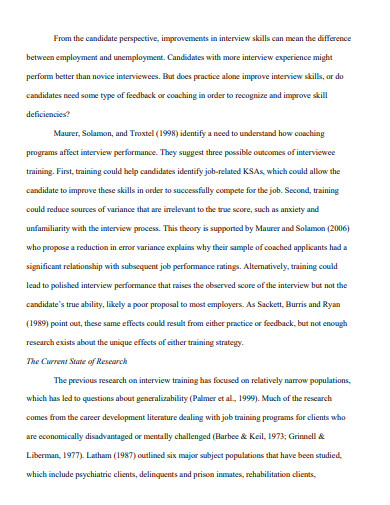
Size: 573 KB
4. Job Interview Question Database Essay
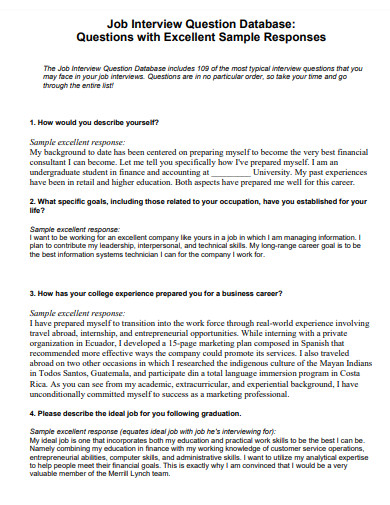
Size: 90 KB
5. Job Interview Essay in PDF
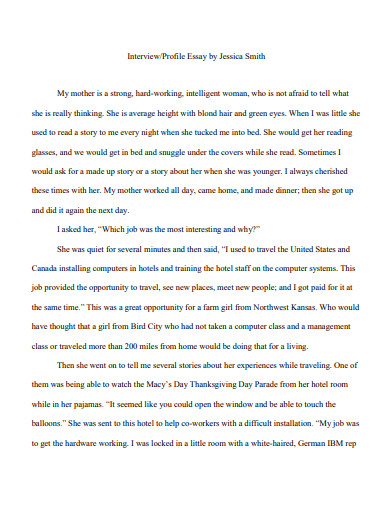
Size: 75 KB
6. Printable Job Interview Essay
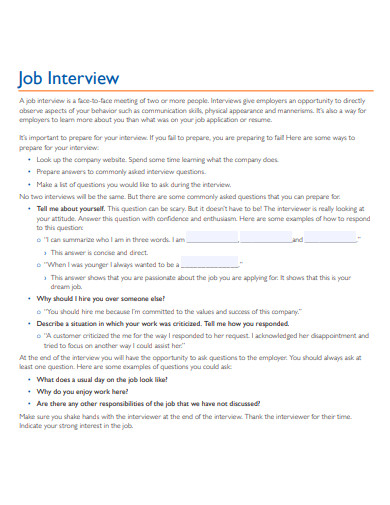
Size: 66 KB
7. Job Interview Strategy Essay
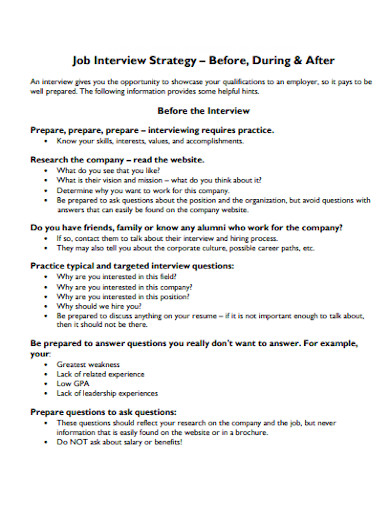
Size: 150 KB
8. Formal Job Interview Essay
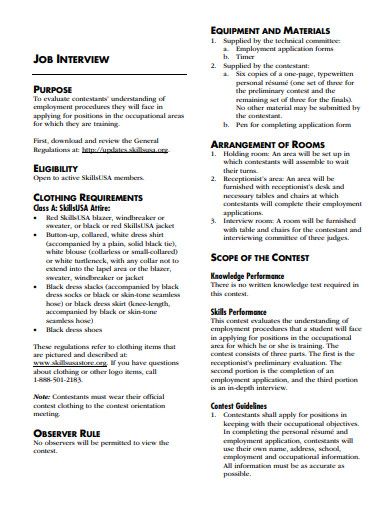
Size: 192 KB
Define Interview
An interview is a meeting face to face. It is usually a conventional conference . A conversation or a questioning for the purpose of getting information from the interviewee.
Define Job Interview
A job interview is a dialogue between an employer and the applicant. In a job interview, the employer asks questions about the applicant’s work history, educational history, and skills.
Things to Avoid in Writing a Job Interview Essay
Some of us get so excited when writing essays, like that of a job interview, but one thing we must remember is to summarize the job interview essay We often forget that an essay is nothing but a short summary of what we wish to write. But that’s okay. It’s nothing different. But unlike some of the essays you may be used to, there are some things to avoid when writing for a job interview essay. Here are some of the things you need to avoid at all cost.
- Lying about your answers – when writing about what is asked, be careful. Interview questions in an essay may be tricky. Do not make up anything to make your essay sound nice. The interviewer would not be amazed one bit if you lied in your essay. Rather, there is a bigger chance they will not accept you.
- Flowery words – Most of us are guilty with this when writing the essay. It is best to avoid putting flowery words to make it sound like we did these things. Again, your employer has a way of knowing you are being truthful or lying. Avoid this at all costs.
- Too proud – this is often taken for granted but I want to put it right here. Do not boast about the experiences you may not have and write it off as yours. Do not boast about the experiences you have in your essay. You have to remain open and humble.
Things You Should Remember When Writing an Essay
- Voice – keep it professional. The tone in your essay has to be in a professional setting. If you write in a childish manner or as if you are angry at someone, your employer or anyone reading it will surely see that you are not fit for the job.
- Information – write what is asked in the essay. Do not put any other information that is not required nor needed. Example for this information is through a question that goes like this “why should we hire you?” This may sound easy but be very careful as to what you are going to write or say. Do not forget to introduce yourself in your essay.
- Explaining – In some questions in an essay, you are required to explain. Like the sample question above, you must give an explanation in your own words as to why they should hire you. However, avoid saying explanations like “because I am the best”, “I am better than anyone.” This will not only make you lose your opportunity, it is also very rude to tell that to your employer.
- Descriptive – keep your essay as descriptive as possible . When you are to general in your writing, you are making the person reading confused. Put a little effort to what you are writing.
- Be prepared – when you are going to a job interview, always expect the unexpected. Answer questions as honest as possible.
- Reflect – reflect on what you have written . Understand what you have learned and done. A job interview essay is simply one of many essays you are going to go through.
I want to write about my experiences related to the job, should I write down everything?
Yes you may. As long as you remember that what you are writing is true and correct. As well as be careful on how you word it. Your tone in writing should be professional.
Why am I not allowed to show off my skills in my essay?
Employers are interested in what you have, but they are not interested in the way you talk about it. They prefer to see someone professional talking about their experiences in the same professional tone. Rather than being too cocky.
Is it necessary to know your skills? What if I don’t?
It is better to know what you are good at. When your employer may state you need to write your skills in the essay, you have to be prepared to do so. Ask yourself what you are good at and write it down.
Is there a time limit to writing the essay?
Most companies give a certain amount of time for the applicant to finish the job interview essay. This is so that neither of the two parties are wasting time. Be prepared to write a good essay within a limited amount of time.
Writing a job interview essay can be difficult. It can also be rewarding knowing you did a good job and you have done what you were told to do. Though a job interview essay may not give you the outcome of getting that job, but it is good practice on showing off your skills. Once you find out how to write a good essay for a job interview, all you need to do is to remember the guidelines.
To remember not to be too cocky when writing about your experiences. Do not be too shy either, rather be professional about it. Employers do read your essay, so be careful what you write. Watch your grammar and how you word things as well. This can affect the opportunity of getting that job. With all that being said, I wish you luck.
Text prompt
- Instructive
- Professional
Describe your preparation process for a job interview in your Job Interview Essay.
Reflect on a successful job interview experience in your Job Interview Essay.
- Guidelines to Write Experiences
- Write Interview Experience
- Write Work Experience
- Write Admission Experience
- Write Campus Experience
- Write Engineering Experience
- Write Coaching Experience
- Write Professional Degree Experience
- Write Govt. Exam Experiences
How to write an Interview Experience?
Hello Geeks,
This is a sample interview experience to show the format of writing an interview experience . It would take just about an hour to write your interview experience, and it’s quite easy.
Include necessary tips and search your asked question on Google or GeeksforGeeks and include its link with the question so that anyone else can refer to it to learn about the solution. If you are not able to find any relevant link to the question on GeeksforGeeks or any other website then you can mention it with the question otherwise you can skip it. On GeeksforGeeks, you can find interview experiences for jobs and internships in product and service-based companies.
How to Write an Interview Experience?
You can create an article on https://write.geeksforgeeks.org/ .
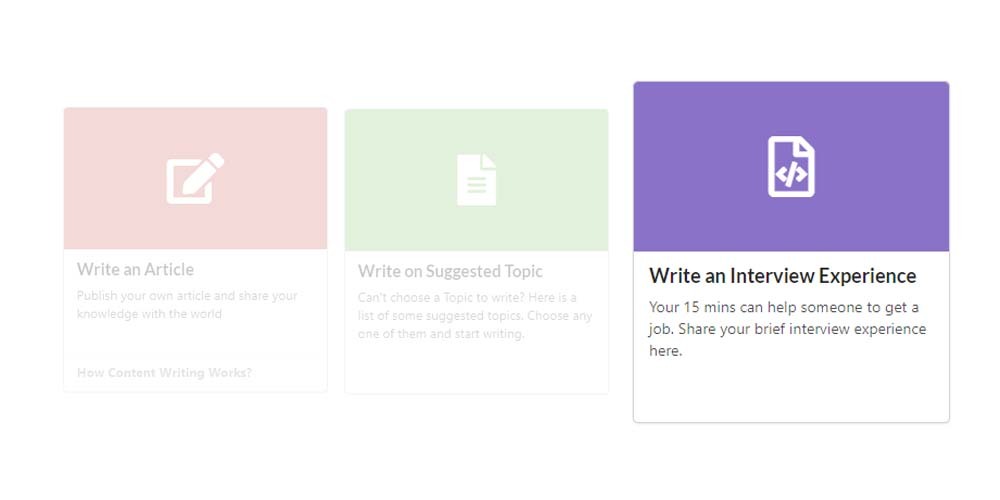
After creating the article, the author may use the preview button to see how it looks and submit it for review and the status of your article will become Pending . The team reviews your article and gives you feedback in comments under the article and saves your article status to Awaiting Author . Finally, after you have made all the required improvements, your article status becomes In Review , which means it has been approved and is going to get published soon. When your article gets published, the status of your article becomes Published .
Below is a sample interview experience and get an insight on how to write your Interview experience .
Sample Interview Experience
- The first round comprised of 50 MCQ questions including aptitude, logical, C output questions, and technical portions (Test Duration: 1 hour):
- Quantitative aptitude and Logical part were much more predominant, the questions were more intuitive and not typical paper pen/formula based. They were not very difficult but were very tricky. Suggestion : I would suggest doing practice from sites like GeeksforGeeks, Indiabix, etc. as it will give the confidence to solve problems.
- The technical aptitude part covered questions from computer networks, operating systems, data structures (particularly tree), digital electronics, and questions from microprocessors & other electronics topics. C output questions were also there.
- Suggestion : I would suggest doing quizzes from GeeksforGeeks to get in touch with all concepts of C and other subjects.
Tips: Solve the questions with a calm mind. Don’t stress yourself during the test because you have to do 50 questions in 60 minutes. Don’t spend too much time on any question if you are not able to do it on the first attempt.
Round-2 (Technical Interview Round-1)
- Questions from the project. My project was on REST, so he asked various typical questions on REST (Why, How, etc). He later asked me to design a REST API for a part of my project.
- He asked me to design an Uber Cab service. He gave me an instant scenario that there are 5 lakh drivers, and they all are sending a request to the server & database at a particular time. He asked how can you manage these requests efficiently. I gave answers by using the concepts of Load Balancer, Sharding, Master-Slave, etc. and he was pretty much happy to listen to the concepts.
- He asked me to write code from the front end to the back end of a particular request from any driver (say sending the information of his current location) of the above-designed Uber using technologies like JavaScript, Ajax, JSON, jquery, servlet, Mysql, etc. I wrote a 2-page code and he was satisfied.
- Later he gave me an instant of the above-designed Uber where sorting was the answer. So I gave him an answer using Comparator of java and wrote code for the same.
- Discussions on MVC architecture. He said suppose you click weather.com on any browser what happens if you use MVC architecture behind and what happens if you haven’t used MVC. We had a good discussion over the use of a Controller in MVC.
Tips : Explain using more diagrams. (I used 4-5 total pages in this interview)
Round-3 (Technical Interview Round-2)
- Again discussion on all projects.
- Discussion over REST and SOAP.
- I have used eXist-db (Native XML Database) as a database in one of my projects and MySQL in another. From there we went to discussions over SQL vs NoSQL. He kept on giving me instances one after other and asked which suits best on each of them(SQL or NoSQL)
- What happens when one ajax call is still running, and you send another ajax call before the data of the first ajax call comes back?
- He asked to write a JavaScript code of simple form comprising login and password info.
Tips : You should know each and every word of your Resume.
Round-4 (Managerial Round)
- Basic questions about team management and team conflict.
- What problems did you face in doing projects technologically wise and managing wisely too?
- He gave me instants which can arise during working in a team and asked what will you do in them.
- Some discussions over what technologies I know.
- Which project do you like the most and why?
Round-5 (HR Round)
- Tell me something about yourself.
- What differentiates yourself from others.
- Little discussions over my extracurricular activities are written in my resume.
- Team Conflict questions.
- What are your future plans related to further studies?
- Do you have any Location constraints?
Tips : Know yourself before any interview. Be calm & answer politely.
You can also check out our Interview Experiences Archive to get more insights about how to write an interview experience .
Please Login to comment...
Similar reads.
- Experiences
- Interview Experiences
- PS5 Pro Launched: Controller, Price, Specs & Features, How to Pre-Order, and More
- How to Make Money on Twitch
- How to activate Twitch on smart TV
- 105 Funny Things to Do to Make Someone Laugh
- #geekstreak2024 – 21 Days POTD Challenge Powered By Deutsche Bank
Improve your Coding Skills with Practice
What kind of Experience do you want to share?
Home — Essay Samples — Life — Life Experiences — Personal Experience
Personal Experience Essays
Personal experiences are the threads that weave the fabric of our lives. Writing a personal experience essay isn't just about storytelling; it's about finding meaning, connecting with others, and leaving your mark on the world. So, why should you write an essay about your personal experiences? Let's explore the importance together! 🌟
Personal Experience Essay Topics 📝
Selecting the right essay topic is key to crafting a compelling narrative. Here's how to pick one:
Personal Experience Argumentative Essay 🤨
Argumentative essays based on personal experiences require you to defend a viewpoint or argument. Here are ten intriguing topics:
- 1. Argue for or against the idea that personal experiences are the most influential factors shaping an individual's personality.
- 2. Defend your perspective on whether overcoming adversity through personal experiences builds stronger character.
- 3. Debate the impact of personal experiences on shaping one's political beliefs and values.
- 4. Argue for the significance of sharing personal experiences in order to promote empathy and understanding among diverse communities.
- 5. Defend the idea that personal experiences play a crucial role in career development and decision-making.
- 6. Debate the ethical implications of sharing deeply personal experiences in the era of social media and oversharing.
- 7. Argue for the therapeutic benefits of writing about and reflecting on personal experiences.
- 8. Defend your perspective on whether personal experiences should be a central part of school curricula.
- 9. Debate the influence of personal experiences on an individual's approach to health and wellness.
- 10. Argue for or against the notion that personal experiences can serve as catalysts for social change and activism.
Personal Experience Cause and Effect Essay 🤯
Cause and effect essays based on personal experiences explore the reasons behind events and their consequences. Here are ten topics to consider:
- 1. Analyze the causes and effects of a life-changing personal experience on your academic or career choices.
- 2. Examine how personal experiences can lead to personal growth, increased self-awareness, and improved well-being.
- 3. Investigate the effects of travel experiences on personal perspectives and cultural understanding.
- 4. Analyze the causes and consequences of sharing personal experiences with others, including its impact on relationships.
- 5. Examine how personal experiences can influence one's hobbies, interests, and leisure activities.
- 6. Investigate the impact of a significant personal experience on your family dynamics and relationships.
- 7. Analyze the causes of personal transformation through exposure to diverse cultures and environments.
- 8. Examine how personal experiences can shape one's attitude toward risk-taking and adventure.
- 9. Investigate the effects of sharing personal experiences through writing, art, or storytelling on your personal well-being.
- 10. Analyze the causes and consequences of personal experiences that challenge societal norms and expectations.
Personal Experience Opinion Essay 😌
Opinion essays based on personal experiences allow you to express your subjective viewpoints. Here are ten topics to consider:
- 1. Share your opinion on the importance of documenting personal experiences for future generations.
- 2. Discuss your perspective on whether personal experiences should be kept private or shared openly.
- 3. Express your thoughts on how personal experiences have shaped your sense of identity and self-worth.
- 4. Debate the significance of personal experiences in fostering empathy and compassion among individuals and communities.
- 5. Share your views on the role of personal experiences in building resilience and coping with life's challenges.
- 6. Discuss the impact of personal experiences on your approach to decision-making and problem-solving.
- 7. Express your opinion on the therapeutic benefits of writing or talking about personal experiences.
- 8. Debate the influence of personal experiences on your sense of purpose and life goals.
- 9. Share your perspective on how personal experiences can inspire creativity and artistic expression.
- 10. Discuss your favorite personal experience and the lessons or insights it has provided.
Personal Experience Informative Essay 🧐
Informative essays based on personal experiences aim to educate readers. Here are ten informative topics to explore:
- 1. Provide an in-depth analysis of the impact of a specific personal experience on your career choices and aspirations.
- 2. Explore the therapeutic benefits of journaling and writing about personal experiences for mental health and well-being.
- 3. Investigate the history and significance of storytelling as a means of preserving personal experiences and cultural heritage.
- 4. Analyze the connection between personal experiences and the development of emotional intelligence.
- 5. Examine the influence of personal experiences on decision-making processes and risk assessment.
- 6. Investigate the role of personal experiences in shaping cultural perceptions and worldviews.
- 7. Provide insights into the art of crafting compelling narratives based on personal experiences.
- 8. Analyze the impact of personal experiences on an individual's resilience and ability to adapt to change.
- 9. Examine how personal experiences can serve as valuable life lessons and sources of wisdom.
- 10. Investigate the therapeutic benefits of group discussions and support networks for individuals sharing similar personal experiences.
Personal Experience Essay Example 📄
Personal experience thesis statement examples 📜.
Here are five examples of strong thesis statements for your personal experience essay:
- 1. "Through the lens of personal experiences, we uncover the profound impact that seemingly ordinary moments can have on our lives, reshaping our perspectives and guiding our journeys."
- 2. "Personal experiences serve as powerful mirrors reflecting our growth, resilience, and capacity to navigate life's challenges, ultimately shaping the narratives of our existence."
- 3. "The sharing of personal experiences is an act of vulnerability and courage, fostering connections, empathy, and a deeper understanding of the human condition."
- 4. "Our personal experiences are the brushstrokes on the canvas of our identity, influencing our choices, values, and the stories we tell ourselves and others."
- 5. "In exploring personal experiences, we embark on a journey of self-discovery, unlocking the untold stories that shape our uniqueness and enrich our shared human tapestry."
Personal Experience Essay Introduction Examples 🚀
Here are three captivating introduction paragraphs to kickstart your essay:
- 1. "Amid the chaos of everyday life, our personal experiences are the constellations that guide us, the moments that define us. As we embark on this essay journey into the depths of our own stories, we unravel the threads of our existence, each tale a testament to the power of the personal."
- 2. "Picture a canvas where the brushstrokes are the chapters of your life—a canvas waiting for you to paint your experiences, thoughts, and emotions. The personal experience essay is your opportunity to create a masterpiece that reflects the colors of your journey."
- 3. "In a world of noise and distractions, our personal experiences are the melodies that resonate within us. As we venture into the heart of this essay, we uncover the symphony of our lives—a composition of highs, lows, and the beauty in between."
Personal Experience Conclusion Examples 🌟
Conclude your essay with impact using these examples:
- 1. "As we close the chapter on this exploration of personal experiences, we are reminded that our stories are the threads that connect us all. The journey continues, and each experience, no matter how small, contributes to the tapestry of our shared humanity."
- 2. "In the final brushstroke of our personal experience essay, we recognize that our stories are not finite; they are ever-evolving, ever-inspiring. The canvas of life awaits, ready for us to create new narratives and continue shaping our destinies."
- 3. "As the echoes of our personal experiences linger, we stand at the intersection of past, present, and future. The essay's conclusion is but a pause in the symphony of our lives, with countless more notes to be played and stories to be written."
250-word About Your Life Experience
250-word about life experience, made-to-order essay as fast as you need it.
Each essay is customized to cater to your unique preferences
+ experts online
1000-word on The Importance of Following Instructions
An unforgettable experience in my life, personal background: my life story as a definition of me, personal experience that made me better than before, let us write you an essay from scratch.
- 450+ experts on 30 subjects ready to help
- Custom essay delivered in as few as 3 hours
Motivation Through Failure: My Life Experience
The role of memorable memories in our lives, the time my uncle died, the importance and role of hard work and efforts in your success, get a personalized essay in under 3 hours.
Expert-written essays crafted with your exact needs in mind
My Most Embarrassing Moment
Memories of happiness and accomplishments in my life, life experience that made me who i am, how i have learnt to appreciate people, the importance of positive people around you, a narrative about regrets in life, the influence of grandmother on my life, mistakes made and lessons learned, my experience in learning to read and write, personal writing: my childhood story, personal writing: experience at the mall, basketball court – my second home, the lessons i have learnt from my life experience, the best travel experience of my life - burma, changing my view of life, the beginning of my nightmare: first day of high school, a personal experience of a course of multicultural education, the lessons i’ve learned in middle school, shyness is not always a curse, relevant topics.
- Personal Growth and Development
- Overcoming Obstacles
- Childhood Memories
- Life Changing Experience
- Law of Life
- Professionalism
- Overcoming Challenges
- Volunteering
By clicking “Check Writers’ Offers”, you agree to our terms of service and privacy policy . We’ll occasionally send you promo and account related email
No need to pay just yet!
Bibliography
We use cookies to personalyze your web-site experience. By continuing we’ll assume you board with our cookie policy .
- Instructions Followed To The Letter
- Deadlines Met At Every Stage
- Unique And Plagiarism Free
Using an interview in a research paper
Consultant contributor: Viviane Ugalde
Using an interview can be an effective primary source for some papers and research projects. Finding an expert in the field or some other person who has knowledge of your topic can allow for you to gather unique information not available elsewhere.
There are four steps to using an interview as a source for your research.
- Know where and how to start.
- Know how to write a good question.
- Know how to conduct an interview.
- Know how to incorporate the interview into your document or project.
Step one: Where to start
First, you should determine your goals and ask yourself these questions:
- Who are the local experts on topic?
- How can I contact these people?
- Does anyone know them to help me setup the interviews?
- Are their phone numbers in the phone book or can I find them on the Internet?
Once you answer these questions and pick your interviewee, get their basic information such as their name, title, and other general details. If you reach out and your interview does not participate, don’t be discouraged. Keep looking for other interview contacts.
Step two: How to write a good question
When you have confirmed an interview, it is not time to come up with questions.
- Learning as much as you can about the person before the interview can help you create questions specific to your interview subject.
- Doing research about your interviewee’s past experience in your topic, or any texts that they have written would be great background research.
When you start to think of questions, write down more questions than you think you’ll need, and prioritize them as you go. Any good questions will answer the 5W and H questions. Asking Who, What, When, Where, Why, and How questions that you need answered for your paper, will help you form a question to ask your interviewee.
When writing a good question, try thinking of something that will help your argument.
- Is your interviewee an advocate for you position?
- Are they in any programs that are related to your research?
- How much experience do they have?
From broad questions like these, you can begin to narrow down to more specific and open-ended questions.
Step three: The interview
If at all possible, arrange to conduct the interview at the subject’s workplace. It will make them more comfortable, and you can write about their surroundings.
- Begin the interview with some small talk in order to give both of you the chance to get comfortable with one another
- Develop rapport that will make the interview easier for both of you.
- Ask open-ended questions
- Keep the conversation moving
- Stay on topic
- The more silence in the room, the more honest the answer.
- If an interesting subject comes up that is related to your research, ask a follow-up or an additional question about it.
- Ask if you can stay in contact with your interview subject in case there are any additional questions you have.
Step four: Incorporating the interview
When picking the material out of your interview, remember that people rarely speak perfectly. There will be many slang words and pauses that you can take out, as long as it does not change the meaning of the material you are using.
As you introduce your interview in the paper, start with a transition such as “according to” or other attributions. You should also be specific to the type of interview you are working with. This way, you will build a stronger ethos in your paper .
The body of your essay should clearly set up the quote or paraphrase you use from the interview responses,. Be careful not to stick a quote from the interview into the body of your essay because it sounds good. When deciding what to quote in your paper, think about what dialogue from the interview would add the most color to your interview. Quotes that illustrate what your interviewer sounded like, or what their personality is are always the best quotes to choose from.
Once you have done that, proofread your essay. Make sure the quotes you used don’t make up the majority of your paper. The interview quotes are supposed to support your argument; you are not supposed to support the interview.
For example, let’s say that you are arguing that free education is better than not. For your argument, you interview a local politician who is on your side of the argument. Rather than using a large quote that explains the stance of both sides, and why the politician chose this side, your quote is there to support the information you’ve already given. Whatever the politician says should prove what you argue, and not give new information.
Step five: Examples of citing your interviews
Smith, Jane. Personal interview. 19 May 2018.
(E. Robbins, personal communication, January 4, 2018).
Smith also claimed that many of her students had difficulties with APA style (personal communication, November 3, 2018).
Reference list
Daly, C. & Leighton W. (2017). Interviewing a Source: Tips. Journalists Resource.
Driscoll, D. (2018 ). Interviewing. Purdue University
Hayden, K. (2012). How to Conduct an Interview to Write a Paper . Bright Hub Education, Bright Hub Inc.
Hose, C. (2017). How to Incorporate Interviews into Essays. Leaf Group Education.
Magnesi, J. (2017). How to Interview Someone for an Article or Research Paper. Career Trend, Leaf group Media.
Vote for your fall favorites in our TODAY Bestsellers: Viewers' Choice poll
- Share this —

- Watch Full Episodes
- Read With Jenna
- Inspirational
- Relationships
- TODAY Table
- Newsletters
- Start TODAY
- Shop TODAY Awards
- Citi Concert Series
- Listen All Day
Follow today
More Brands
- On The Show
- TODAY Plaza
I’ve always been critical of my body. Then I saw what it was capable of
When I chose to freeze my eggs — something that took me two years to mull over and decide — I sought out the consult of women my age who had already done the same. A frequent warning I got was about a common physical side effect of the process: “Covering the bloat” was something I was repeatedly told I’d have to deal with. So naturally, when my timeline was set in stone, I put together a wardrobe for work and play that I hoped would do the trick.
But then, once I was in the thick of the process, something surprising happened. I realized that I didn’t care how I looked. At all .
Let me back up to one of my earliest memories — it’s relevant, I promise. It was August 1994, my third birthday party, and my parents graciously gifted me the presence of my favorite movie stars: Aladdin and Jasmine. I used to watch “Aladdin” every day, sometimes multiple times a day, so I’ve been told. I loved the fairy-tale aspect, and I idolized Jasmine — maybe because I hadn’t seen Middle Eastern beauty represented anywhere else.
When actors dressed as Aladdin and Jasmine showed up at our house, I froze. I remember thinking, “I can’t believe these people are in my home, and they’re here for me!” I could barely smile or speak — I just kept staring at them in awe, starstruck. After singing a couple of songs in front of my friends and me, it was time for cake (probably my favorite part). My mom set out the cake along with crudité and other bites for the parents, and while I was thinking, “I can’t wait to eat that cake,” I heard Jasmine behind me squeal in excitement. She must have been as eager for cake as I was! We have something in common , I thought excitedly. Then she said, “Ooh, cucumbers!”
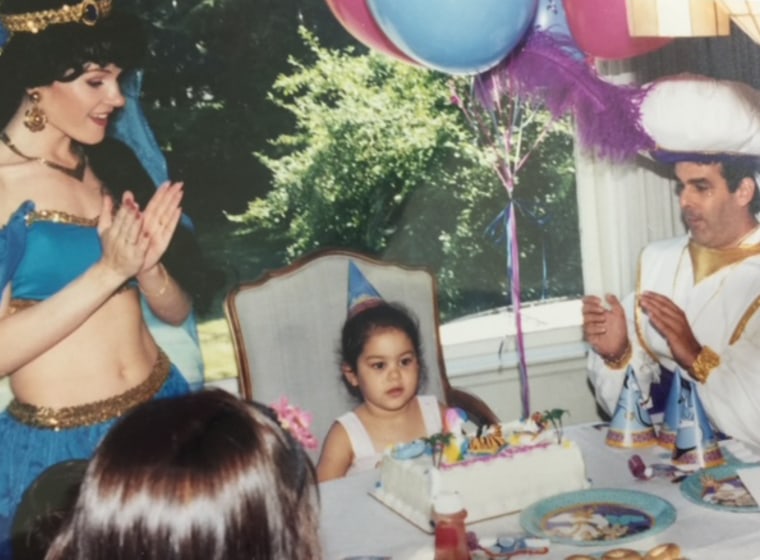
That moment has been ingrained in my psyche since I heard those two words. I remember thinking that if I want to look and be like Jasmine, well then I, too, need to prioritize the cucumbers over the cake.
And yes, I was only 3 years old, but we all have a first memory we can’t forget.
My brain was wired around food and body image from a young age, hitting its peak distress in my late teens and early 20s. My insecurities around my body took up so much room in my brain.
As an adult, I’ve done a lot of work to feel more comfortable in my body, and to stop being so hard on myself — but that seed of negativity never fully went away. I’m the type of person who asks to avoid seeing the number on the scale when I get weighed at doctor’s appointments, and if I accidentally see the number, mental havoc rules my week. I’m also the type of person to have an intense HIIT workout routine for both physical upkeep and mental release. So, I’ll be honest — when the time was approaching for my egg freezing cycle to begin, I was anxious about not what my body would feel, but how I would feel about how it looked.
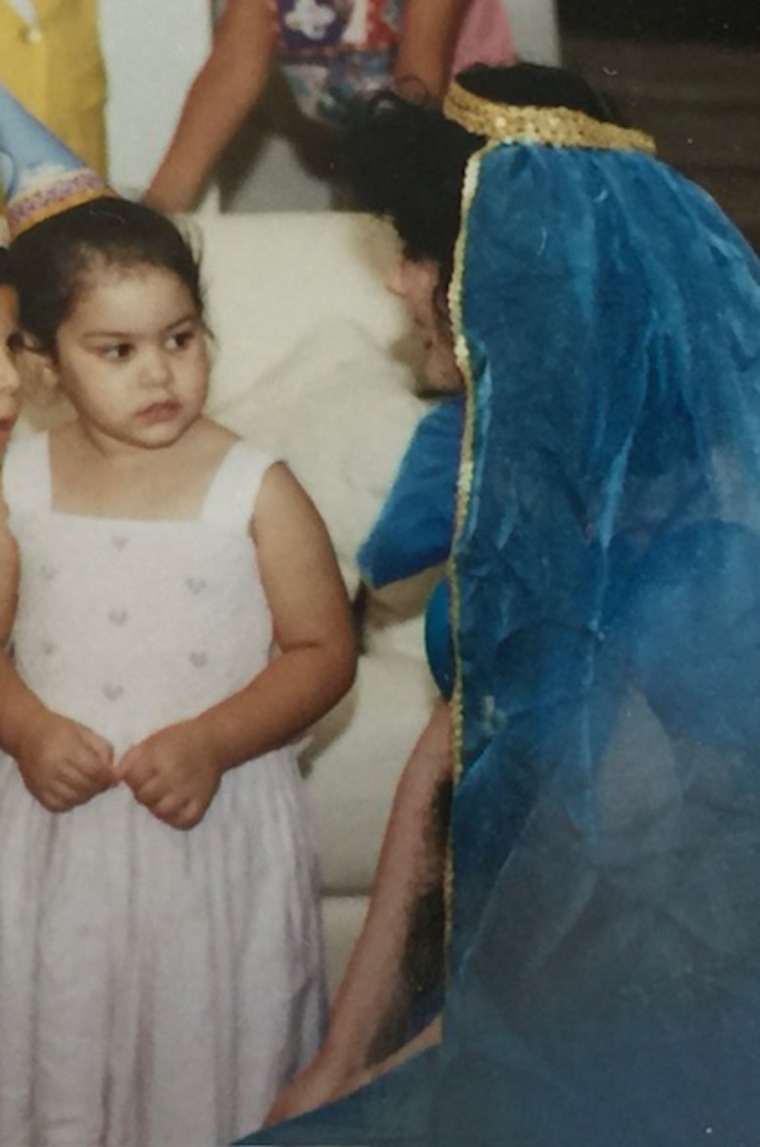
What I never expected though was to completely embrace my body — mentally, physically and emotionally — throughout egg freezing, despite the fact that, yes, I was bloated and also had to limit physical activity. For two weeks I injected myself with hormones 2-3 times a day, combining the solutions on my own, feeling quick bouts of injection pain and periods of fatigue, and traveling to doctor’s appointments constantly. After each shot, ultrasound or blood draw, I’d await my body’s reaction. Would I feel run down? Stressed? Anxious about any expansion around my stomach? I waited, but that’s not what happened. I mostly felt … strong. I was surprised and delighted by what my body was capable of. The strength I felt made me feel immensely grateful for my body and what it could endure. I felt empowered. The experience also, frankly, made me angry at myself for all the times I criticized my body’s appearance in the past, and all the time and energy I wasted on that way of thinking.
I mostly felt … strong. I was surprised and delighted by what my body was capable of. The strength I felt made me feel immensely grateful for my body and what it could endure. I felt empowered.
Body image is a construct. It is an idea of what society deems to be subjectively appealing and has been supported by the media over decades and generations. I’m so glad society is evolving and becoming more welcoming of all shapes and sizes, but you can’t rely on internet culture and the news cycle for acceptance, especially since what is acceptable is constantly changing. It needs to come authentically and wholeheartedly from within.

I wanted to freeze my eggs in my 32nd year, and I did just that: My egg retrieval was on my last day of being 32. For my 33rd birthday — exactly three decades after that birthday party I remember as a girl — I started the year with a clean slate, freeing up that space in the back of my mind that used to be hyper-focused on what I looked like, for something new.
I vow to be less critical of how my body appears, and more in touch with how it feels. I vow to be mindful of the cucumbers and enjoy the cake, and maybe I can help other women be less critical of their bodies, too. Our bodies endure and are capable of so much. They hold so much power and strength. We should own the power of our bodies. We should be grateful for them. After this experience, I know I will be.
Donna Farizan is a contributor for TODAY's fourth hour with Hoda and Jenna.

IMAGES
VIDEO
COMMENTS
Suppose that you have an assignment to research a topic, conduct an expert interview, and write an essay on your findings. One of the most…
Learn how to write an engaging and informative interview essay with these valuable tips and guidelines.
Reflection Paper on Interview Experience. It was a sunny afternoon when I sat down for an interview that would change the course of my career. The anticipation and nerves were palpable as I waited for the interviewer to call my name. As I reflect on this experience, I realize how much I have learned from it and how it has shaped my ...
Learn how to write an interview essay and review a list of sample questions you can ask your subject to gather relevant information for your essay or paper.
Personal Experience During an Interview Essay. Decent Essays. 655 Words. 3 Pages. Open Document. When I think of the word interview I think of it as a series of questions asked from one person to another to seek information. In my previous assessment we were asked to interview a fellow peer, on their personal experience of QIBT so far this year.
Even if you have given many interviews, your first job interview experience would remain as a memorable one forever. For some of you, it would have given a positive experience and for some, a negative experience.
Learn how to write an insightful and engaging interview essay with helpful tips and step-by-step guidelines.
An interview essay is designed to give the reader a general impression of the interview subject and to present their thoughts on a select group of topics. It also offers the opportunity to develop deeper insights by analyzing the...
Struggling with your interview essay? Learn about the significant information that must be included in your essay with a few guidelines.
Master writing an interview essay with our guide. Learn to tell engaging stories, ask the right questions, and make your writing truly connect!
Free Essay: My Ordeal Thump, thump. I could vividly hear my heart pound through my chest every time the thought entered my mind. My interview for Sole Hope's...
Satisfactory Essays. 857 Words. 4 Pages. Open Document. During the interview I learned various things about how a person who once was dreaming of a career worked hard to make that dream closer and closer to reality. I always thought about jobs as boring, stressful, and tiring ways to make money to sustain one's life.
During a job interview, you may be asked to describe your previous work experience. Even though your resume will include details about your prior job roles, knowing how to answer this question during an interview can help you highlight the skills you feel are most valuable in the prospective role. In this article, we discuss how to craft an effective response when asked about your work ...
What Makes a Great Essay Want a good grade on your essay? Instructors and testing agencies assign a lot of personal experience-type essays, so it is worth your time to know how to write one easily and effectively so that you get a top score.
Are you a job applicant trying their best to write a good job interview essay? Here are some that can help you with that. 7+ Job Interview Essay Examples.
Explore interview questions and answers about your experience and tips to give a thorough answer to help you prepare for your next interview successfully.
My first job interview was an experience that I will never forget. My anxiety reached the point of exacerbation during the fifteen minutes that I spent in the empty lobby. I had intentionally arrived fifteen minutes earlier than my appointed time and was only accompanied by my own thoughts, which were fraught with worry.
Reflection On Interview Experience. 724 Words3 Pages. Student's Reflections Interview Experience This interview was very enlightening and a learning experience. The interview gave me the new perspectives in my life and exposed to different facet of reality. I learned from Mr. R.A.M experiences and life events that you should always take the ...
Hello Geeks, This is a sample interview experience to show the format of writing an interview experience. It would take just about an hour to write your interview experience, and it's quite easy. Include necessary tips and search your asked question on Google or GeeksforGeeks and include its link with the question so that anyone else can ...
Interview reflection paper Recently, a number of international students who come to study abroad seem to be increasing. Most of them aim for an achievement in educational institutions. It has been increasingly more difficult for international graduate students to understand the academic expectations in terms of academic writing. As a part of my assignment, I had a chance to interview Alissa ...
Use our step-by-step instructions to write Personal Experience essays and papers. Check out over 50 examples for your successful essay in one click.
Using an interview can be an effective primary source for some papers and research projects. Get tips on finding interviewees and conducting a good interview.
My brain was wired around food and body image from a young age, hitting its peak distress in my late teens and early 20s. My insecurities around my body took up so much room in my brain.
Discover what an internship experience essay is, learn how to write an internship reflection paper, explore tips and read a template and example as a guide.